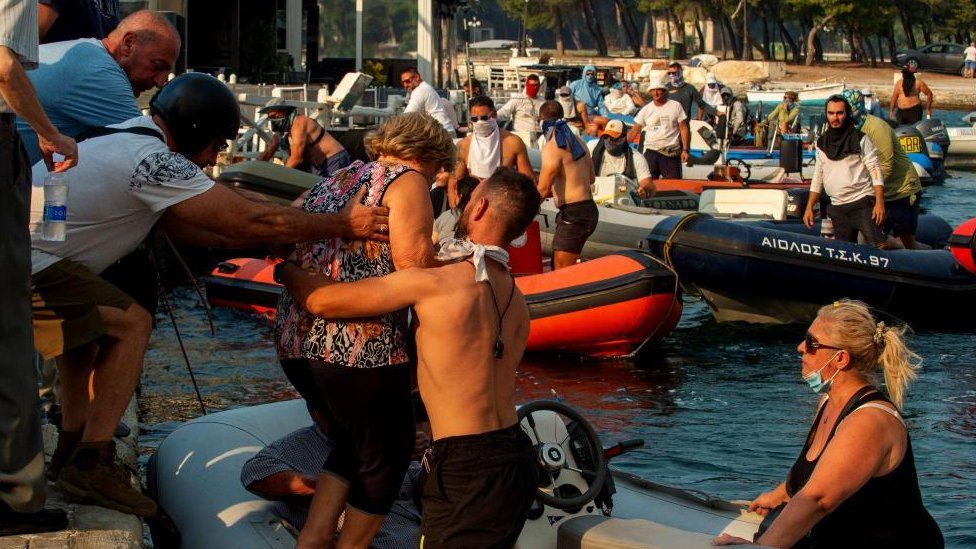This video can not be played
To play this video you need to enable JavaScript in your browser.
The Greek air force had to evacuate F-16 fighter jets from their base on Thursday after heat from wildfires triggered powerful explosions at a nearby ammunition depot.
Shock waves were felt miles away and 133 residents of the nearby town of Nea Anchialos escaped by sea.
The coastal base is home to the Greek Tactical Air Force’s 111 Combat Wing.
Reports suggest F-16 missiles and bombs are stored at the depot 6km (3.7 miles) north of the runway and planes.
As the wildfire reached the western end of the base on Thursday evening, police set up a security perimeter and the area was rocked by several powerful explosions, including a dramatic blast heard at 19:18 (16:18 GMT).
No-one was hurt, but windows were shattered in Nea Anchialos and several villages in the area were evacuated as church bells rang out warning residents to leave their homes.
The shock wave was felt some distance up the coast of the Magnesia region in the city of Volos. A major wine co-operative just outside Nea Anchialos went up in flames.
During the afternoon, residents fled by road and by sea, as the coast guard and private boats ferried people to safety.
The air force said later that the 111 Combat Wing base was safe. The ammunition depot was brought under control and the fleet of F-16s were flown to the Larissa headquarters of another combat squadron.
Bombs and air-to-surface missiles are stored at the base, as well as dozens of F-16s, and it is considered one of the most important for the air force.
Greek daily Kathimerini reported that the ammunition depot was so tightly packed that its fire safety systems had not worked.
The system was in effect rendered useless by the sheer volume of explosives, the paper said, and the munitions that blew up may have overheated rather than coming into direct contact with the fires.
The Greek fire service said on Friday that conditions were beginning to improve after more than a week of raging fires in central Greece, as well as the islands of Rhodes, Corfu and Evia.
Thousands of holidaymakers and residents have had to flee popular destinations in the past week.
Although the fires have largely subsided, Greece has been mourning the deaths of two pilots whose Canadair water-bomber plane crashed while fighting a fire in Karystos on Tuesday.
A funeral was held for one of the pilots, 27-year-old Periklis Stefanidis, on Thursday,while his colleague Christos Moulas was due to be buried on Friday on the island of Crete.
President Katerina Sakellaropoulou was due to attend the funeral along with Moulas’s pregnant wife.
- Are arsonists behind Italy’s devastating wildfires?
Water-bombing planes have also been in action in Croatia as firefighters deal with a fire on the island of Ciovo near Split.
Almost 150 firefighters battled fierce winds and two people were reportedly arrested in connection with the fire. By Friday morning the blaze was said to be under control.
This month is set to become the hottest month on record, according to both the World Meteorological Organization and the EU’s Copernicus climate change service (C3S).
On Thursday, UN Secretary-General António Guterres warned that the era of global warming had ended and that “the era of global boiling” had arrived.
“The extreme weather which has affected many millions of people in July is unfortunately the harsh reality of climate change and a foretaste of the future,” said the World Meteorological Organization’s Secretary-General, Prof Petteri Taalas.


Related Topics
- Greece
- Wildfires
- Climate change
